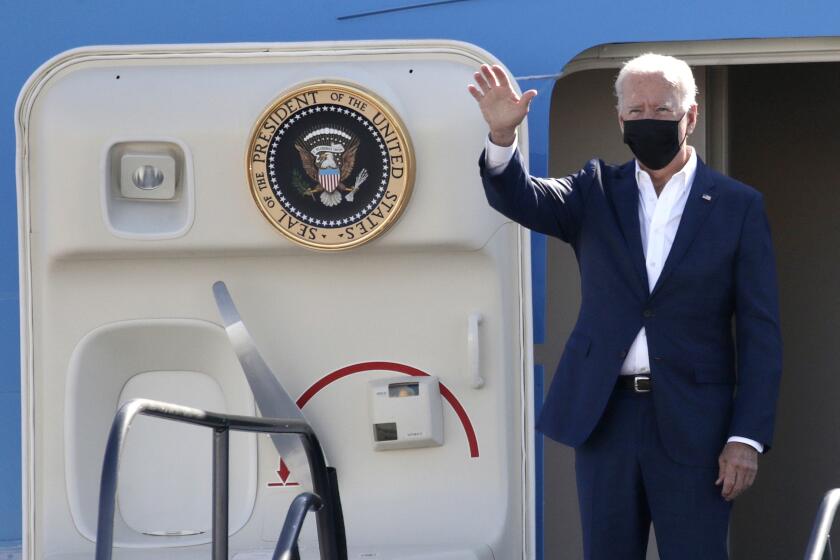Op-Ed: How Congress could curtail the Big Oil gravy train

- Share via
The fossil fuel industry is a poster child for corporate welfare.
Federal subsidies and tax breaks prop up fossil fuel development, even when drilling projects should be too expensive to turn a profit. Below-market leasing rates, royalties and fees subsidize oil and gas companies, encouraging them to exploit our public lands and leaving taxpayers on the hook for the environmental damage.
In the “Build Back Better” Act, Congress has an opportunity to make oil and gas corporations play by the same rules as everyone else. The House has included common-sense oil and gas reforms in its version of the bill, and the Senate should follow suit.
Taxpayers should get a fair return from oil and gas companies that drill on publicly owned lands and waters. The House bill would make this change. Right now, these polluters pay below-market rates to extract resources that belong to all Americans.
The federal government’s current 12.5% royalty rate for onshore drilling was established by the Mineral Leasing Act of 1920. It has not been updated for more than a century, even where technological advances have reduced the financial risk of drilling. By contrast, states are far more aggressive in ensuring their taxpayers are not ripped off — even states that tend to be friendly to fossil fuel companies — with Wyoming and Utah collecting about 17% in royalties and Texas going as high as 25%.
Modernizing the federal royalty rate would provide huge benefits to Americans. Taxpayers lost out on more than $12 billion over the past decade because polluters weren’t paying fair market rates for drilling on public lands and waters, according to Taxpayers for Common Sense. Recovering these dollars would enable Congress to allocate more money to other programs in the bill, including those that protect the environment and make it easier for families to afford the rising costs of childcare, pre-K and higher education.
The House’s Build Back Better Act also closes a legal loophole that leaves taxpayers, instead of oil and gas companies, on the hook for cleaning up shut-down wells. Under the current requirements, the bonding coverage that polluters purchase up front to make sure environmental remediation costs are paid doesn’t come close to covering the actual cleanup costs. In effect, that means that oil and gas companies can profit off pollution, then leave taxpayers to deal with the mess they leave behind.
President Biden’s infrastructure plans and tax cuts add up to $3.5 trillion, but remember that the Republican tax cuts of 2017 added up to $5.5 trillion.
In California, taxpayers paid $27 million of a $45-million bill for cleaning up a man-made island off Rincon Beach in Ventura County that was built for oil drilling in the 1950s. In Colorado, the 2019 bankruptcy of PetroShare, a small drilling firm, left about 50 wells for the state to clean up at taxpayer expense.
Updating decades-old federal bonding rules will protect taxpayers from billions in liabilities down the road. The logic here should be familiar to even a first-grader: If you make a mess, you need to clean it up.
A recent Public Citizen report detailed the extent to which the fossil fuel industry and its executives are grabbing as much cash as possible. Even as their companies falter — and as they impose huge liabilities on the public— Big Oil executives are coming out ahead.
The Public Citizen report found that of the fossil fuel companies that filed the 25 largest bankruptcy cases over the past three years, 76 of their executives received a combined $200 million in cash bonuses, retention payments and severance — an average payout of about $2.6 million per executive. At the same time, more than 10,500 workers at these companies lost their jobs. Cleanup costs for the oil and gas wells the companies controlled could top $10 billion.
Fossil fuel executives receive exorbitant payouts regardless of whether they lead their companies to success or failure. But while executives line their pockets, workers lose jobs, shareholders lose money and taxpayers may wind up footing the bill for environmental cleanup.
It will come as no surprise why these giveaways have remained in place for decades. These corporate handouts are a direct result of the industry’s clout in the nation’s capital. Oil and gas interests spent more than $112 million in lobbying last year and have made more than $350 million in political contributions over the past 30 years. Members of Congress who have received millions in oil and gas campaign contributions routinely do the oil industry’s bidding.
As the great harm climate change is doing becomes increasingly clear, it’s more important than ever that we act on what may be a once-in-a-generation chance to overcome the oil and gas industry’s concentrated political power. In the coming weeks, the fossil fuel industry will undoubtedly put up a fight.
But if the public keeps up the pressure on their lawmakers, Congress may have the courage to eliminate many longstanding fossil fuel subsidies and giveaways. Make your voice heard. Hold the industry accountable so it can no longer count on taxpayers for a free ride.
Katie Porter (D-Irvine) represents California’s 45th District in the House of Representatives. Robert Weissman is president of Public Citizen.
More to Read
A cure for the common opinion
Get thought-provoking perspectives with our weekly newsletter.
You may occasionally receive promotional content from the Los Angeles Times.











